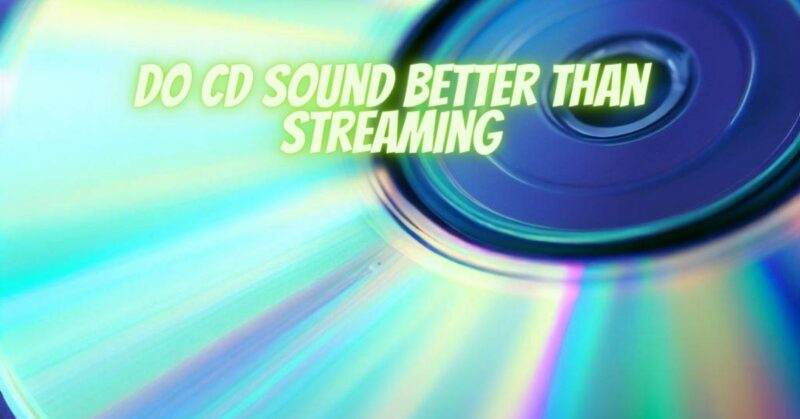In the digital age of music consumption, the battle between traditional formats and modern streaming platforms has intensified, with audiophiles and music enthusiasts debating the merits of sound quality. Compact Discs (CDs) have long been revered for their high-fidelity audio, while streaming services offer convenience and accessibility. In this article, we’ll dive into the factors that influence the sound quality of CDs and streaming, exploring whether CDs truly sound better than streaming.
CDs: A Legacy of High-Fidelity Audio
Compact Discs have earned a reputation for delivering superior sound quality due to their uncompressed audio and high bit rates. CDs store music in a linear, continuous format that translates into a faithful reproduction of the original recording. With a sampling rate of 44.1 kHz and a bit depth of 16 bits, CDs capture a wide range of frequencies and nuances in the music, resulting in clarity, detail, and dynamic range.
Additionally, CDs are not susceptible to the lossy compression used in many streaming services, which sacrifices audio quality for reduced file sizes. This lack of compression contributes to a more accurate representation of the music’s original recording, ensuring that audiophiles can appreciate the subtleties that artists and engineers intended.
Streaming: Convenience and Compression
Streaming services have revolutionized the way we consume music, offering vast libraries accessible across devices. However, the convenience of streaming often comes at the cost of audio quality. Many streaming platforms employ audio compression algorithms, such as MP3 or AAC, which discard certain audio data to reduce file sizes and facilitate faster streaming. While this compression is convenient for bandwidth considerations, it inevitably compromises the finer details of the music.
However, it’s important to note that streaming platforms have responded to audiophile demands by offering higher-quality streaming options. Lossless streaming, like FLAC (Free Lossless Audio Codec) or ALAC (Apple Lossless Audio Codec), provides higher-quality audio compared to standard MP3 or AAC formats. This caters to those who prioritize sound quality and are willing to invest in premium streaming subscriptions.
Listening Environment and Equipment
The perceived difference in sound quality between CDs and streaming can also be influenced by the listening environment and the equipment used. Audiophile-grade equipment, including high-end speakers, headphones, amplifiers, and Digital-to-Analog Converters (DACs), can reveal the nuances present in CDs. However, these differences may be less noticeable when using standard consumer-grade equipment.
Moreover, the listening environment itself plays a crucial role. Factors such as room acoustics, speaker placement, and ambient noise can impact how the music is perceived, potentially diminishing the distinctions between CD and streaming sound quality.
Subjective Perception
Perceptions of sound quality are highly subjective and can vary from person to person. Some individuals may possess a heightened ability to discern subtle differences in sound quality, while others may not notice significant disparities. Personal preferences and listening habits also play a role in determining whether CDs sound better than streaming.
The question of whether CDs sound better than streaming is not a straightforward one. While CDs offer uncompressed audio and high fidelity, streaming services provide unparalleled convenience and accessibility. Advances in streaming technology have led to improved audio quality options, catering to those who prioritize sound quality.
Ultimately, whether CDs sound better than streaming depends on several factors, including the listener’s equipment, listening environment, individual preferences, and willingness to invest in higher-quality streaming services. In the end, the decision between CDs and streaming hinges on striking a balance between audio fidelity and modern-day convenience.


